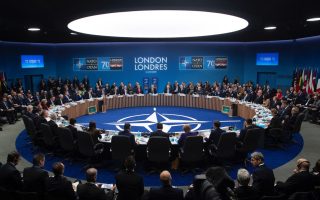North Macedonia decides its future

Crucial elections are taking place in North Macedonia next week, following a three-month delay because of the pandemic.
Relations between Athens and Skopje are much improved since the 2018 signing of the name deal. Still, the vote is important because it will determine whether the Balkan nation will continue on the Euro-Atlantic path that was cleared by the Prespes Agreement, largely due to Greece’s consent, or whether it will return to a path of uncertainty, which would endanger the prospects of its people, but also relations with Greece.
Former prime minister Zoran Zaev had the courage to agree to a compromise that brought significant benefits to North Macedonia, foremost of which was full and equal participation in NATO and the prospect of European Union accession, and he seems determined to stay on this path.
The opposition, in contrast, has heeded the sirens of going against the Prespes Agreement, jeopardizing the country’s multiple benefits.
It is of course up to the people to decide which direction they want to take and what they want their country’s priorities to be.
Greece wants to continue supporting North Macedonia’s Euro-Atlantic trajectory and its institutional modernization. It also wants to offer itself as an important trading partner, on the condition, of course, that the Prespes deal is upheld and the new government in Skopje takes an active interest in settling a number of lingering differences.
Greece is a natural partner and ally for North Macedonia. Apart from the access it provides from its northern port in Thessaloniki, it also serves as a safety net and offers protection to the small landlocked country against external dangers. The recent overflights by Greek and US planes in its skies were a reminder of this.
Greece is also one of the most fervent supporters of North Macedonia’s EU membership, and proved it most recently by encouraging several members of the bloc to consent to the start of accession negotiations with Skopje.
With regard to the Prespes Agreement itself, Greece has upheld it faithfully. It was negotiated and signed by former prime minister Alexis Tsipras and his successor Kyriakos Mitsotakis continues to uphold it, despite his pre-election objections.
What our neighbors need to understand is that this stance is a strategic choice by the Greek side which at the same time is looking forward to the accession talks that will comprise binding agreements on a series of issues, such as the use of trademarks.
As North Macedonia marches toward elections on July 15, we can only hope that the voters choose a Euro-Atlantic future and safeguard the course to institutional modernization, economic prosperity and regional partnerships that they are on. That they do not jeopardize their gains, but instead further strengthen the positive reception from allies and partners in the last couple of years who hail it as a stability factor in the Balkans.





